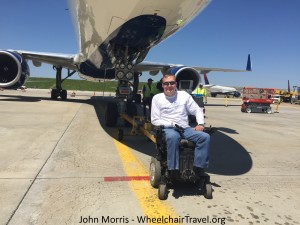Advertiser Disclosure: Eye of the Flyer, a division of Chatterbox Entertainment, Inc., is part of an affiliate sales network and and may earn compensation when a customer clicks on a link, when an application is approved, or when an account is opened. This relationship may impact how and where links appear on this site. This site does not include all financial companies or all available financial offers. Opinions, reviews, analyses & recommendations are the author’s alone, and have not been reviewed, endorsed, or approved by any of these entities. Some links on this page are affiliate or referral links. We may receive a commission or referral bonus for purchases or successful applications made during shopping sessions or signups initiated from clicking those links. The content on this page is accurate as of the posting date; however, some of the offers mentioned may have expired.
I am so happy to know John and he simply inspires me. John travels more miles than most folks I know and he does it with a 200 pound wheelchair, overcoming travel issues most never ever even dream of. In addition to being a Delta / Skyteam elite traveler, he also runs a website you should visit WheelchairTravel.org. And now on to his guest post for this week:
Travel with our friends and family members with disabilities can be tiresome and difficult. Domestic travel with a disability can be easily managed if you understand the rights and protections outlined under the Air Carrier Access Act (ACAA). Unfortunately, these protections apply only to flights that involve a departure from or arrival to the United States. Travel to foreign lands and on foreign airlines can be more difficult, so it is important to educate yourself on their policies and procedures. After a car accident and three amputations, I re-entered the skies in January 2014 and have flown about 250,000 total miles on SkyTeam carriers with my power wheelchair since. Here are a few tips to make international travel with a wheelchair on SkyTeam as painless as possible.
* Notify the foreign carrier directly
Even if you are on a Delta purchased ticket, it is important to notify any foreign carrier of your needs directly. Delta cooperates extensively with Air France and KLM, but disability service requests are not always passed through to their systems. Even if your flight onward from an international SkyTeam hub is a Delta codeshare, it is important to make sure the operating carrier has made the necessary accommodations for your travel.
If you are traveling with your own wheelchair, be prepared with the chair’s dimensions, battery type and weight when you call or e-mail the airline. Remember, the other SkyTeam carriers use the metric system, so you’ll need dimensions in centimeters and weight in kilograms. Google can help with the conversion.
If you want to gate check your wheelchair and have it delivered to the gate on arrival, tell them. It is not standard practice abroad, and must be requested. More on what to expect later.
* Arrive two hours before departure abroad
While this is not always necessary in America, it is highly recommended to check-in early when traveling on a foreign carrier. Remember, you’ll have to go through passport control, customs and security, which can take time in a wheelchair. If you plan to take a personal wheelchair to the gate, particularly a power chair, you should expect to spend up to thirty minutes at the check-in desk. Check-in agents have to fill out extensive amounts of paperwork for powered chairs, especially in Asia. An early arrival at the airport will save you from the worry and hassle of missing your flight.
*Avoid tight connections
I have previously missed my international connection if I had a layover of less than two hours. If you are traveling with a gate-checked power wheelchair, I strongly advise a minimum 2-hour connection if you hope to have it returned. Disability services as a whole operate more slowly abroad, particularly in the large airports of Amsterdam, London, Paris, Shanghai and Tokyo. Oftentimes, particularly at Amsterdam’s Schiphol airport, agents will refuse to return a gate-checked wheelchair. Be prepared to insist on fighting (calmly and with a kind spirit!) to receive the accommodations you reserved. Remember, on flights that originate in the United States, airlines are required to deliver the wheelchair to the gate. It will happen, but you must insist and allot the time to have that discussion.
* Roll with the punches
Even in the United States, disability services are far from perfect. Air Carrier Access Act violations occur every day. Internationally, they occur with much greater frequency. Prepare yourself by committing to remain calm in the face of frustration. A sincere willingness to cooperate with airline staff on the ground goes a long way. Displaying anger throws fire on the situation and leads to nothing that is positive. That said, standing firm (or sitting, for us!) is also critical to ensuring that your rights are protected and the appropriate disability services provided.
I have traveled on the SkyTeam airlines of Air France, China Eastern, China Southern, Delta, Kenya Airways and KLM with my wheelchair. I have also traveled on Virgin Atlantic, which is not a SkyTeam carrier, but a strong partner of Delta Air Lines. My experiences have been mixed, with some being excellent and others quite frustrating. I am also aware that travel with a power wheelchair creates an additional layer that complicates my travel. If you can use a manual wheelchair, or do not wish to have your power chair returned to the gate, it is likely that your experiences will, on the whole, be at least slightly better than mine have been.
I understand that what I have said here may not inspire you to jump on a flight and head to another continent. Remember, though, that travel amounts to only one day in each direction. We travel for the destination. The destination can hold experiences like the London Bridge, Eiffel Tower or the Great Wall of China. Don’t deny yourself an opportunity to satisfy your wanderlust just because of a disability and the hassles of travel. Nothing is impossible.
Finally, if you should have a negative experience with disability services and believe that your rights under the ACAA have been violated, please report that experience to the U.S. Department of Transportation. Very few disabled travelers report these violations, which gives the government little incentive or basis for enforcing the ACAA. As a disabled community, we must fight for our civil rights just like the many groups that have come before us. Action will not come if we remain silent.
Safe travels up in the air! – John
John Morris is the globe-trotting founder of WheelchairTravel.org. He holds a B.S. in history and political science and a M.S. in history from Florida State University. Following a serious car accident in 2012, he became a triple amputee and has since committed his life to opening the world for others. Having flown nearly 200,000 miles in 2014, he is among the world’s most traveled wheelchair users.
Advertiser Disclosure: Eye of the Flyer, a division of Chatterbox Entertainment, Inc., is part of an affiliate sales network and and may earn compensation when a customer clicks on a link, when an application is approved, or when an account is opened. This relationship may impact how and where links appear on this site. This site does not include all financial companies or all available financial offers. Opinions, reviews, analyses & recommendations are the author’s alone, and have not been reviewed, endorsed, or approved by any of these entities. Some links on this page are affiliate or referral links. We may receive a commission or referral bonus for purchases or successful applications made during shopping sessions or signups initiated from clicking those links.













Great article. You are an inspiration! Thanks.
This is a great article and thank you for sharing the experience.
Excellent article. And if you (or others with disabilities) need assistance fighting for your rights, please let the rest of us know how we can help!